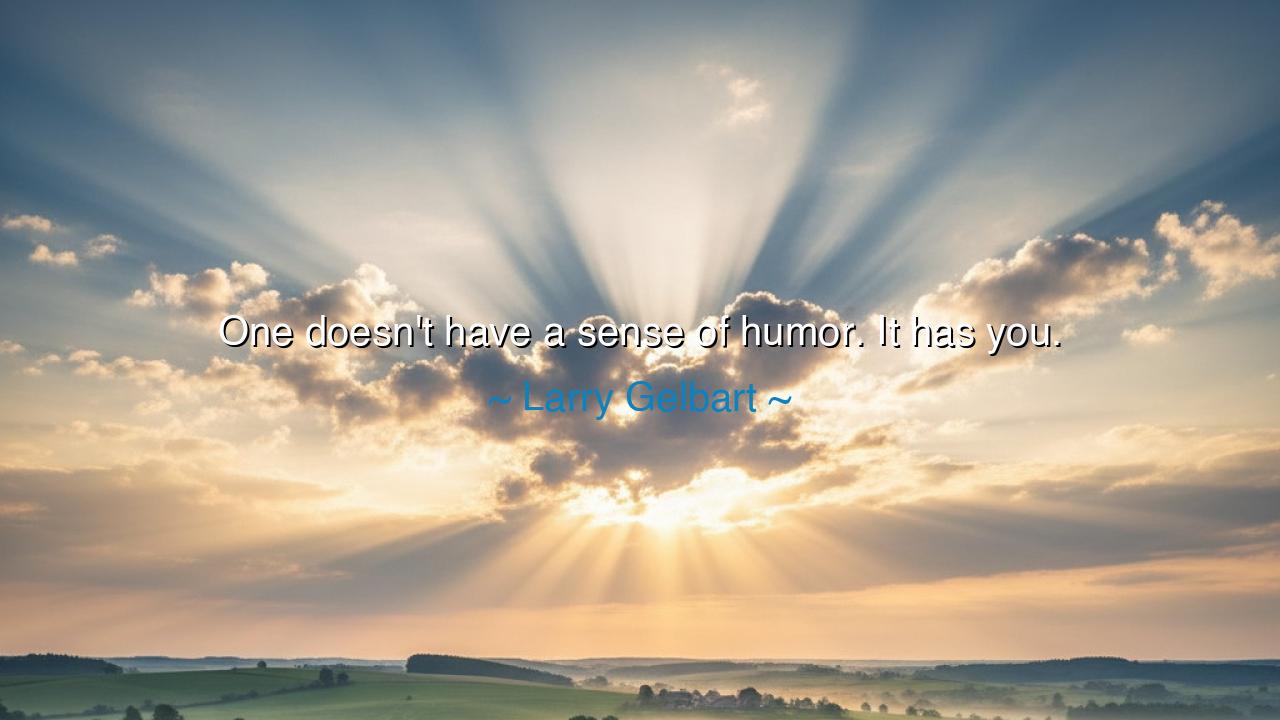
One doesn't have a sense of humor. It has you.






In the chronicles of wit and wisdom, there arises a saying from Larry Gelbart, a master craftsman of laughter and truth: “One doesn’t have a sense of humor. It has you.” Though short, this utterance glows with the light of paradox, as many truths do. It reminds us that humor is not a possession to be wielded, nor an ornament to be worn, but a living spirit that dwells within the soul, choosing whom it will inhabit. It is the wild muse of humanity—sometimes merciful, sometimes mischievous—binding us to humility and freeing us from despair. For laughter, when it grips the heart, does not ask permission; it claims us, body and soul, and teaches us to see the world anew.
In the days of the ancients, there were those who believed that inspiration came from the gods themselves—a whisper from Apollo, a madness from Dionysus, a spark from the Muses. Humor, too, is such a divine madness. It descends upon us like a storm of light. One cannot force it, cannot summon it by will or intellect. When Gelbart said it has you, he meant that true humor is possession, not performance. It overtakes you when you glimpse the folly of life and smile instead of despairing. It is the soul’s rebellion against the tyranny of sorrow. The one who laughs is not its master but its vessel.
Think of the great Charlie Chaplin, that silent poet of laughter. He did not “have” a sense of humor in the way a man has a tool; he was possessed by it. His humor rose from suffering itself. Born in poverty, scarred by loss, he transformed his pain into the laughter of millions. When the world was darkened by war and want, Chaplin’s little tramp stumbled, fell, and smiled again—and in that smile, humanity saw itself redeemed. That is the mark of one who is had by humor: he becomes its messenger, its conduit, its light in times of shadow. Chaplin did not mock the world from above; he wept with it and laughed through it.
Those who “have” humor as a thing to display, as one wears a badge of cleverness, know only the shell and not the spirit. Their laughter is practiced, their wit is sharp but hollow. But those whom humor “has”, those seized by the vision of the absurd and the beautiful entwined, see life whole. They understand that to laugh is to accept one’s imperfection and yet rejoice in existence. They feel the sacred pulse beneath the jest. Humor does not excuse pain—it transforms it. It does not flee from tragedy—it dances upon its edge, teaching the heart to bear the unbearable.
There is an ancient tale told of Nasreddin Hodja, the wise fool of the East. One day, his neighbors mocked him for losing his donkey. They jeered, saying, “Nasreddin, where is your wisdom now?” He smiled and replied, “My wisdom is still here; it is my donkey that is gone.” The crowd burst into laughter, but beneath their laughter was revelation: even in loss, one may choose lightness. The joke was not mere wit—it was spiritual armor. Humor had him, and through it, he turned ridicule into wisdom, grief into grace.
So remember, O seekers of truth: you cannot control humor; you can only welcome it. It comes like a breeze through an open window—unannounced, refreshing, beyond command. Do not strive to “be funny,” for such striving breeds vanity. Instead, open yourself to the rhythm of life, to its contradictions, its sorrows, and its sudden wonders. Humor will find you when your heart is supple, when you can see the irony of existence and yet love it still.
And thus, the teaching of Gelbart stands as both warning and blessing: do not clutch at humor as though it were yours to keep. Let it move through you as the river through the valley. Laugh, not because life is easy, but because it is beautiful in its chaos. To be had by humor is to be alive in the fullest sense—to see the divine comedy that threads through all mortal struggle.
Carry this lesson with you, children of tomorrow: when laughter rises within you, let it. When irony unveils truth, embrace it. Do not seek to own your humor; let it own you. For the soul that can laugh even at itself has conquered despair, and the spirit that can weep and laugh in the same breath has found the secret harmony of the world.






AAdministratorAdministrator
Welcome, honored guests. Please leave a comment, we will respond soon